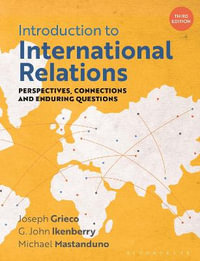"Once in a while a book comes along that breathes new life into an
old topic. Scheuerman's book on Morgenthau accomplishes this task
admirably."
Perspectives on Politics
"Scheuerman?s introduction is the introduction Hans
Morgenthau deserves: focusing on the intellectual life of the
Weimar Republic and on other emigre scholars such as
Hannah Arendt not only shows where Morgenthau?s epistemology
and ontology were grounded, but the author also does away with the
still common misreading of Hans Morgenthau as the founding father
of a
predominantly structural realism."
International Affairs
"As a scholarly endeavor teasing out the nuances and ambiguities
and historical tendencies in Morgenthau's evolving corpus,
Scheuerman's book does not disappoint."
SAIS Review
"Scheuerman rightly describes Morgenthau as an uneasy realist;
he recognized the importance of power but also the dangers involved
in the pursuit and exercise of power. His focus was accordingly as
much on agency and ethics as it was on structural attributes of the
international system. Scheuerman describes a thinker of particular
relevance to our time and his thoughtful analysis of the evolution
of Morgenthau's thought makes his book an essential read to anyone
with a serious interest in international relations."
Richard Ned Lebow, Dartmouth College
"Few thinkers have been so influential and yet so misunderstood
as Hans Morgenthau. William Scheuerman's superb study provides both
a comprehensive reconstruction of Morgenthau's thinking and a
challenging interpretation of its contemporary significance.
Sweeping in its breadth and finely balanced in its judgments, this
is not only a defining work of intellectual history; it is also a
first-rate work of international political theory in its own
right."
Michael Williams, University of Ottawa
"Once more the tired old cliche about realism being an apologia
for power and a rationalization for the status quo is put to the
sword in Bill Scheuerman's great new book. Indeed if he is right -
and that twentieth century realism emerged out of debates on the
inter-war left and not as the natural heir of some two thousand
year tradition dating back to Thucydides - then we will have to
rethink the history of contemporary International Relations in more
ways than one. A brilliant and iconoclastic study of one of the
greats of IR."
Michael Cox, London School of Economics and Political
Science

























